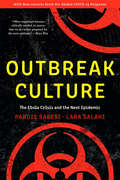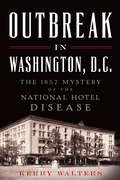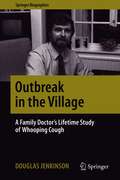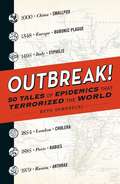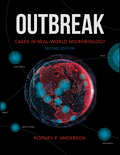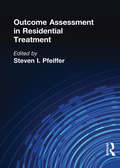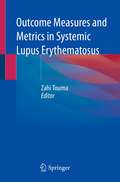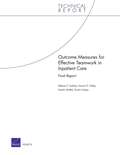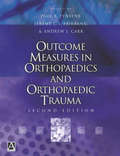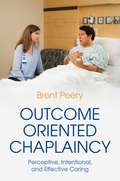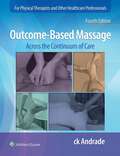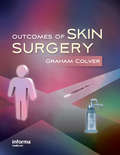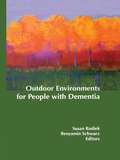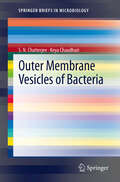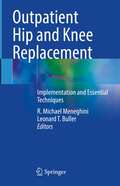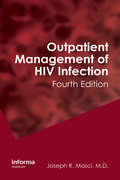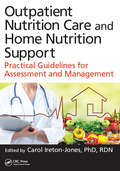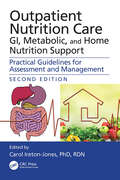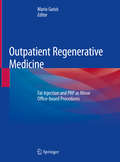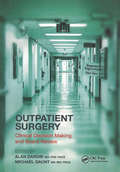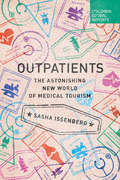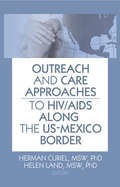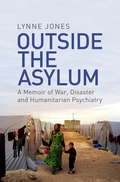- Table View
- List View
Outbreak Culture: The Ebola Crisis and the Next Epidemic, With a New Preface and Epilogue
by Pardis Sabeti Lara SalahiA Choice Outstanding Academic Title of the Year “A critical, poignant postmortem of the epidemic.” —Washington Post “Forceful and instructive…Sabeti and Salahi uncover competition, sabotage, fear, blame, and disorganization bordering on chaos, features that are seen in just about any lethal epidemic.” —Paul Farmer, cofounder of Partners in Health “The central theme of the book…is that common threads of dysfunction run through responses to epidemics…The power of Outbreak Culture is its universality.” —Nature “Sabeti and Salahi present a wealth of evidence supporting the imperative that outbreak response must operate in a coordinated, real-time manner.” —Science As we saw with the Ebola outbreak—and the disastrous early handling of the COVID-19 coronavirus pandemic—a lack of preparedness, delays, and system-wide problems with the distribution of critical medical supplies can have deadly consequences. Yet after every outbreak, the systems put in place to coordinate emergency responses are generally dismantled. One of America’s top biomedical researchers, Dr. Pardis Sabeti, and her Pulitzer Prize–winning collaborator, Lara Salahi, argue that these problems are built into the ecosystem of our emergency responses. With an understanding of the path of disease and insight into political psychology, they show how secrecy, competition, and poor coordination plague nearly every major public health crisis and reveal how much more could be done to safeguard the well-being of caregivers, patients, and vulnerable communities. A work of fearless integrity and unassailable authority, Outbreak Culture seeks to ensure that we make some urgently needed changes before the next pandemic.
Outbreak in Washington, D. C.: the 1857 Mystery of the National Hotel Disease (Disaster Ser.)
by Kerry WaltersAn account of the mysterious epidemic among nineteenth-century hotel guests that &“enthralled the country and nearly took the life of the-President-elect&”(The Washington Post). The National was once the grandest hotel in the capital. In 1857, it twice hosted President-elect James Buchanan and his advisors, and on both occasions, most of the party was quickly stricken by an acute illness. Over the course of several months, hundreds fell ill, and over thirty died from what became known as the National Hotel disease. Buchanan barely recovered enough to give his inauguration speech. Rumors ran rampant across the city and the nation. Some claimed that the illness was born of a sewage &“effluvia,&” while others darkly speculated about an assassination attempt by either abolitionists or southern slaveowners intent on war. In this concise and captivating account of the events—as well as the panic and rumors surrounding them—Kerry Walters investigates the mysteries of the National Hotel disease.
Outbreak in the Village: A Family Doctor's Lifetime Study of Whooping Cough (Springer Biographies)
by Douglas JenkinsonOutbreak in the Village is a fascinating account of the personal and professional journey of Dr. Doug Jenkinson, physician and researcher. Over the course of four decades in practice, Jenkinson traces the reemergence of whooping cough in the developed world, using his practice in the idyllic English countryside as a clinical control group. Keeping meticulous notes and indulging an itch to investigate, he explores one of history's most enigmatic and pervasive diseases. Jenkinson relates the tale of his life's work amid winsome anecdotes, relevant history, and practical advice. Told in an amiable, engaging voice with an expert balance of levity and earnestness, this story will charm casual readers interested in medical history and memoir, as well as doctors and researchers who identify with the experiences and may benefit from the research and techniques employed. Readers will find themselves in the examination room beside Jenkinson as the investigation unfolds, learning about the nature of the illness and the sweeping detrimental effects of an anti-vaccination campaign. An intriguing memoir about a mysterious illness, a public health failure, and one doctor's quest for clarity, Outbreak in the Village is a tale of perseverance and objectivity sure to delight and inform.
Outbreak!: 50 Tales of Epidemics That Terrorized the World
by Beth SkwareckiFrom ancient scourges to modern-day pandemics! Throughout history--even recent history--highly contagious, deadly, and truly horrible epidemics have swept through cities, countrysides, and even entire countries. Outbreak! catalogs fifty of those incidents in gruesome detail, including:The Sweating Sickness that killed 15,000, including Henry VIII's older brotherSyphilis, the "French Disease," which spread throughout Europe in the late fifteenth centuryThe romantic disease: tuberculosis, featured in La Boheme, La Traviata, and Les MiserablesThe worldwide outbreak of influenza in 1918, which killed 3 percent of the populationThe mysterious appearance of HIV in the 1980sThe devastating spread of Ebola in West Africa in 2014From ancient outbreaks of smallpox and plague to modern epidemics such as SARS and Ebola, the stories capture the mystery and devastation brought on by these diseases. It's a sickeningly fun read that confirms the true definition of going viral.
Outbreak: Cases in Real-World Microbiology (ASM Books)
by Rodney P. AndersonOutbreak: Cases in Real-World Microbiology, 2nd Edition, is the newest edition of this fascinating textbook designed for introductory microbiology students and instructors. Thoroughly revised, this collection of case studies of real-world disease outbreaks, generously illustrated in full color, offers material that directly impacts college-level students, while the book's unique presentation offers instructors the flexibility to use it effectively in a number of ways. More than 90 outbreak case studies, organized into six sections according to the human body system affected, illustrate the wide range of diseases caused by microbial pathogens. The studies are presented at differing levels of difficulty and can be taught at all undergraduate levels. Each case study includes questions for students to think about, discuss, and answer, and the book includes an appendix that directs students to the specific reference material on which each case was based, providing the opportunity to investigate further and to apply the reference content to the case being studied. Each of the six sections of the book concludes with a College Perspective and a Global Perspective case study. The College Perspective provides a direct and practical link between the microbiology course and the daily lives of students. The Global Perspective connects students with outbreaks that have occurred in countries around the world to facilitate understanding of the social, religious, economic, and political values at play in the treatment and prevention of infectious disease. At the end of every section, detailed descriptions offer concise yet complete information on each disease involved in that section.
Outcome Assessment in Residential Treatment
by Steven I PfeifferAs residential treatment centers and psychiatric hospitals are increasingly asked to document their effectiveness, it is essential for mental health care providers to demonstrate the efficacy and cost-effectiveness of the services they provide. Outcome Assessment in Residential Treatment helps health care providers demonstrate that their planned treatment is necessary and active rather than simply custodial. A practitioner’s guide to conducting treatment outcome assessment projects, this innovative book presents readers with historical perspectives, current issues, and practical suggestions for implementing an outcome assessment project.Outcome Assessment in Residential Treatment guides psychiatrists, psychologists, mental health practitioners, and social program administrators in addressing which therapeutic components contribute to the goals and objectives of their programs and which may require modification, radical revision, or even elimination. It helps residential treatment centers and psychiatric treatment facilities document treatment successes and better understand which factors (within the client, family, environment, treatment setting, or combinations therein) predict successful outcome. This objective data empowers readers to influence government and industry, enhance public awareness of the needs of severely disturbed children and youth, and validate the usefulness of intensive psychiatric treatment.Unlike other books on treatment outcome, Outcome Assessment in Residential Treatment tells readers how to determine clinically significant improvement and not simply statistically significant change. It gives practical, detailed, proven advice on how to carry out studies that will benefit residential treatment centers and the psychiatric and mental health fields. Contributors provide tools to validate/demonstrate that psychiatric and mental health treatments are effective. They offer insight into: planning a treatment outcome project recognizing ethical, practical, methodological, logistical, and clinical considerations in implementing a treatment outcome project selecting instruments to assess treatment outcome and measuring success comparing different outcome measuresHealth care providers must have accurate information about treatment outcomes to demonstrate that specific services are beneficial, cost-effective, and well-received by the client. Outcome Assessment in Residential Treatment helps readers evaluate the impact a treatment program has on a client’s clinical status and psychosocial and educational functioning, making it possible to provide an objective yardstick for the payer’s evaluation of the quality of care provided.Psychiatrists, psychologists, mental health practitioners, and social program administrators will find Outcome Assessment in Residential Treatment an essential guide to evaluating and understanding the relative effects of specific interventions or procedures on the quality and effectiveness of their services. They will use this information to make appropriate changes which guarantee that they best meet their clients’mental health care needs.
Outcome Measures and Metrics in Systemic Lupus Erythematosus
by Zahi ToumaSystemic Lupus Erythematosus (SLE) is a chronic autoimmune disease that manifests with a myriad of clinical and laboratory features. The assessment of SLE is comprehensive and includes different core set domains; disease activity, damage, health-related quality of life, adverse events and economic impact. This comprehensive book is focused on the instruments and outcome measures utilized in the assessment of SLE. It targets different audiences including physicians, scientists/researchers and different health professionals interested in learning about the art of measurement in SLE. The book highlights the importance of measurement in the assessment of SLE in a clinical settings, research and clinical trials. Each of the chapters provide a systematic approach to the instruments utilized in the assessment of a specific construct in SLE (e.g., disease activity, fatigue, etc.) and incorporate a comprehensive coverage of disease specific and disease generic measures. It also discusses different patient-reported outcomes that are crucial to reflect patient perceptions of their health condition and cover constructs such as fatigue, pain, anxiety and depression, cognition, frailty, and many others.
Outcome Measures for Effective Teamwork in Inpatient Care
by Donna O. Farley Susan L. Lovejoy Melony E. Sorbero Soeren MattkeAddresses one step in the process of moving from teamwork training to teamwork practices that improve outcomes of care: identifying outcomes that are most likely to be affected as teamwork practices improve in an implementing organization. Discusses a literature search, methods for selecting and testing candidate measures, measures highly rated by clinical experts, and results of measure testing on administrative data of the DoD health system.
Outcome Measures in Orthopaedics and Orthopaedic Trauma, 2Ed
by Jeremy Fairbank Paul Pynsent Andrew CarrOrthopaedics and orthopaedic trauma are highly complex subjects that can prove difficult to quantify, but accurate measurement is required for setting standards of care and for assessing the severity of an injury. This book will help the reader assess outcome instruments, and provides many references to sources of instruments and techniques to use.
Outcome Oriented Chaplaincy: Perceptive, Intentional, and Effective Caring
by Brent PeeryOutcome Oriented Chaplaincy (OOC) is a method of chaplaincy care that emphasizes achieving, describing, measuring, and improving the outcomes that result from a chaplain's work, alongside the parallel framework of evidence-based healthcare. This book examines the underlying principles of OOC and incorporates first-hand accounts of chaplains who have made a measured difference to patients and their families. Brent Peery draws on more than fifteen years of experience within the field of Outcome Oriented Chaplaincy, exploring its evolution and history within the complex culture of healthcare, and how its underlying principles of assessments, interventions, outcomes and documentation are most effectively put into practice. This practical guide will benefit chaplains interested in the approach of OOC, and identify a framework for providing the best spiritual care for those facing life's most difficult moments.
Outcome-Based Massage: Across the Continuum of Care
by Carla-Krystin AndradePraised for its engaging approach and contemporary coverage, Outcome-Based Massage: Across the Continuum of Care, 4th Edition, continues a tradition of excellence in equipping students for success on board reviews and transitioning theory into clinical practice. Reflecting the fields of massage therapy, physical therapy, athletic training, education, psychology, medicine, and physiology, author ck Andrade and a team of experts deliver a comprehensive understanding of Outcome-Based Massage™ and its clinical applications at an accessible breadth and depth. This extensively updated edition integrates principles and techniques across the continuum of care and aligns content with the latest evidence, clinical practice guidelines, and healthcare regulations to help users confidently meet clients’ unique needs and achieve superior treatment outcomes.
Outcomes Measurement in the Human Service: Cross-Cutting Issues and Methods (2nd Edition)
by Jennifer L. Magnabosco Ronald W. Manderscheidhe book provides readers with both macro- and micro-perspectives on the topics of outcomes measurement; incorporates practice, policy, and research perspectives; and examines current and long-standing issues within the human services field with regard to outcomes and performance measurement. With numerous authors from the field of social work, this new edition of Outcomes Measurement in the Human Services also boasts contributions from professionals in the fields of psychology, psychiatry, policy research, administration, and numerous other social sciences. With its thorough, authoritative coverage of the issues of outcomes measurement and accountability, this book is appropriate for and directly relevant to courses in evaluation research, clinical practice, social policy, and administration.
Outcomes of Skin Surgery: A Concise Visual Aid
by Graham ColverThere is a great need for a visual resource to document, with clarity, the possible outcomes of surgery, including side effects and complications, and how these outcomes vary from individual to individual. Using a straightforward approach, Outcomes of Skin Surgery: A Concise Visual Aid is an easy-to-consult and highly illustrated reference for surg
Outdoor Environments for People with Dementia
by Susan Rodiek Benyamin SchwarzLearn how gardens and parks can be beneficial to residents Mounting evidence reveals that nature and outdoor environments provide individuals with dementia greater enjoyment in life, lower stress levels, and positive changes to physical well-being. Outdoor Environments for People with Dementia explores how fulfilling the fundamental genetically based need of human relationships with nature can improve the health and well-being of people with dementia. Top experts analyze current research and comprehensively examine how the design processes of gardens and parks can be closely connected to effective interventions. Evaluation tools for those with dementia are discussed, including studies of the impact of plants and outdoor activities on this population. Outdoor Environments for People with Dementia discusses in detail practical approaches that can significantly improve the quality of life for dementia victims. Research is discussed revealing important aspects and issues needing to be addressed when creating better outdoor environments that are effective in helping residents of long term care facilities and residential care homes. The text is extensively referenced and provides several tables, figures, and photographs to clearly illustrate concepts. Topics discussed in Outdoor Environments for People with Dementia include: the impact of outdoor wandering parks and therapeutic gardens on people with dementia empirical studies on how access to and participation in nature-related activities can benefit people with dementia interventions to restore people with dementia having directed-attention fatigue evaluation tools for gardens for people with dementia research-based design recommendations for future gardens theories and empirical studies about healing gardens training staff to increase their knowledge about horticulture and encouraging them to involve residents in outdoor activities general guidelines for developing an outdoor space examination of the attributes for the superior outdoor space found in Grand Rapids, Michigan, with design recommendations for the future Outdoor Environments for People with Dementia is a valuable resource for scholars, policymakers, legislators, architects and urban planners, lending institutions, developers, landscape architects, and the lay public in general who have an interest in the subject-personal, professional, or civic.
Outer Membrane Vesicles of Bacteria
by Keya Chaudhuri S. N. ChatterjeeThis book provides a detailed account of the physico-chemical properties and biological functions of the outer membrane vesicles (OMVs) of different pathogenic and non-pathogenic Gram-negative bacteria. It also includes an authentic record of the first systematic study that discovered the mechanism of OMV formation by a pathogen, Vibrio cholerae, and proposed that the process represented a novel secretory activity of bacteria. Furthermore, the authors present clinical and laboratory data on the use of OMVs as immunogens, as effective and licensed vaccines against Neisseria meningitidis serogroup B infections and on the development of more effective vaccines against other human and animal pathogens including Vibrio cholerae. This volume thus bears witness to the emerging revolution in the field of vaccines against pathogens and closes with a discussion of open questions and future research on OMVs.
Outpatient Hip and Knee Replacement: Implementation and Essential Techniques
by R. Michael Meneghini Leonard T. BullerOutpatient surgery and early discharge is the hottest topic in hip and knee arthroplasty and will continue to be in the coming years: It is expected that over 50% of all hip and knee arthroplasties will be performed in the outpatient setting by 2026. Currently, a central text that encompasses all of the unique aspects of performing hip and knee arthroplasty in the outpatient setting does not exist. Furthermore, as surgeons across the US and abroad are incentivized and encouraged by government and commercial payors, as well as patients, to perform these surgical procedures in the outpatient setting, the educational material must be available to disseminate the unique perioperative and surgical strategies and techniques accordingly. This book is unique in that it will address all the essential elements and considerations to promote surgeon success in this endeavor and enhance patient safety through the transition of hip and knee arthroplasty into the outpatient setting, as well as how to implement such a program into practice. Topics discussed include patient selection, medical optimization and risk management, anesthetic surgical techniques, pain management protocols, and postoperative physical therapy. Later chapters cover practical issues surrounding outcome metrics, discharge criteria, minimizing patient readmissions, financial considerations, and additional implications for hospitals, ASCs and payers.Filling a glaring gap in the literature on this popular new topic, Outpatient Joint Replacement is an ideal resource for orthopedic surgeons, notably hip and knee specialists, as well as residents, fellows and supporting clinical staff.
Outpatient Management of HIV Infection
by Joseph MasciThis book presents a complete global examination of the complications, diagnoses, and management of HIV infections. This is essential for the HIV specialist and for those involved in HIV care. This book provides information on the constantly changing and expanding drug therapies and treatment strategies for HIV, the latest developments and frequently updated treatment guidelines, and a review of at the expansion and routinization of HIV testing.
Outpatient Nutrition Care and Home Nutrition Support: Practical Guidelines for Assessment and Management
by Carol Ireton-JonesNutrition, defined by Merriam-Webster, is the process of eating the right kind of food so you can grow properly and be healthy. However, making the right food and nutrition choices and finding the best and most accurate nutrition information can be a challenge, especially when a disease or injury is present. <P><P>There are a wide range of ways that nutrition can be healing, from a simple broth that provides fluids and electrolytes to therapeutic nutrition for diabetes, irritable bowel syndrome, or osteoporosis. Registered Dietitian Nutritionists (RDN) have expertise in disease management and translation of nutrition requirements to foods to consume. However, nutrition care often does not receive the attention in the out-patient setting that is needed to achieve nutrition goals. <P><P>The purpose of this book is to provide pertinent and concise nutrition care information for Registered Dietitian Nutritionists and other professionals working with individuals outside of the hospital including nurses, pharmacists, and physicians. This book covers screening, assessing, and treating malnutrition; out-patient nutrition care in diabetes, cardiovascular disease, gastrointestinal disease, osteoporosis; and home enteral and parenteral nutrition. In each chapter the reader will learn more about the disease process as well as the management of the disease or therapy. <P><P>As the number of patients receiving home care nutrition support increases, proper assessment and management of this therapy is crucial, and clinicians need to practice at an advanced level. This book presents advanced and readily applicable information on proper nutrition care of individuals in the outpatient setting and those receiving home nutrition support.
Outpatient Nutrition Care: Practical Guidelines for Assessment and Management
by Carol Ireton-Jones Berkeley LimketkaiAs the number of patients receiving home care nutrition support increases, proper assessment and management of this therapy is crucial, and clinicians need to practice at an advanced level. This second edition provides practical nutrition care information for professionals working with individuals outside of the hospital including registered dietitians, nurses, pharmacists, and physicians. It covers screening, assessing, and treating malnutrition; outpatient nutrition care in diabetes, cardiovascular disease, gastrointestinal disease, and home enteral and parenteral nutrition. Each chapter describes the disease process as well as the management of the disease or therapy. Key Features Presents practical information on proper nutrition care of individuals in the outpatient setting and those receiving home nutrition support New information on GI tests and procedures; gastroparesis/pancreatitis, parenteral lipids, and bariatric surgery Expanded chapter on short bowel syndrome and malabsorptive disorders Additional information on feeding options including an overview of oral, oral supplements, and enteral and parenteral nutrition Teaches the user additional information on disease processes as well as the management of the disease or therapy
Outpatient Regenerative Medicine: Fat Injection and PRP as Minor Office-based Procedures
by Mario GoisisThis book is unique in focusing expressly on regenerative medicine in the aesthetic field. With the aid of more than 400 color pictures, it provides step-by-step descriptions of procedures that can be performed easily in the private practice. The number of people pursuing anti-aging and cosmetic procedures in order to achieve a youthful, healthy, or simply improved aspect is continually increasing. At the same time the available techniques and materials have undergone rapid innovation in terms of both safety and quality. The practitioner no longer looks just at the correction or camouflage of an unwanted feature but rather also aims to address the aging process itself. Regenerative medicine appears to provide a unique and unlimited opportunity in this context. Autologous fat grafting, adipose-derived stem cells, and autologous platelet-rich plasma represent just some of the attractive options that can be used for volume restoration and facial rejuvenation.
Outpatient Surgery: Clinical Decision Making and Board Review (Radcliffe Ser.)
by Alan Dardik Gaunt MichaelThis third edition focuses on answering questions that are relevant to North American surgeons' everyday practice and in preparation for their professional examinations. It contains both modern American practice style as well as to include the most up-to-date information since the previous edition.
Outpatients: The Astonishing New World Of Medical Tourism
by Sasha IssenbergToday more people travel to Hungary for dental care than to any other country in Europe. The fascinating story of how Hungary became Europe's dental chair is a case study in medical tourism, which has become a growing multi-billion-dollar industry -- exploding in places as varied as India, Brazil, Korea, and Costa Rica -- as countries rewrite laws to compete for patients. Doctors and dentists have to run a business, but does globalization destroy the dream of high-quality universal health care? Sasha Issenberg, the acclaimed author of The Sushi Economy and The Victory Lab, goes on the trail of dental tourism in Eastern Europe in search of answers.
Outreach and Care Approaches to HIV/AIDS Along the US-Mexico Border
by Herman Curiel Helen LandGet the latest on culturally sensitive health care practices The United States-Mexico border region extends over 2,000 miles, and those residing there struggle to come to grips with several health and poverty challenges. Outreach and Care Approaches to HIV/AIDS Along the US-Mexico Border discusses the various complex factors influencing the control of HIV/AIDS along the US-Mexico Border. The book presents in-depth insights into the problems of language differences, lack of resources, poverty, culture, social stigma, fear of rejection from their communities, and other pressing issues dealing with this devastating health challenge. Practical approaches and strategies are detailed, emphasizing culturally sensitive health care practices.Outreach and Care Approaches to HIV/AIDS Along the US-Mexico Border reveals the latest research and assessment of services currently taking place in various states along this region. Innovative outreach strategies are described, along with accompanying studies detailing the program&’s success in targeting a specific issue. The book is extensively referenced and includes numerous tables and figures to clarify ideas and quantify data. Topics in Outreach and Care Approaches to HIV/AIDS Along the US-Mexico Border include: Health Resources and Services Administration&’s efforts of its HIV/AIDS Bureau (HAB) practical expanded HIV counseling and testing a study on personal lifestyles and demographics of 1200 HIV seropositive individuals current research on health access issues the New Mexico Border Health Initiative (NMBHI) use of peer outreach-with programmatic elements, implications for practice, and recommendations for program coordinators the implementation and evaluation of an AIDS Education and Training Center (AETC) physician training program examination of an effective pilot HIV prevention intervention targeting Mexican/Latino migrant day laborers counseling intervention for female sex workers Transcultural Case Management (TCM) intervention program and its resultsOutreach and Care Approaches to HIV/AIDS Along the US-Mexico Border shines a crucial spotlight on the neglected problem of HIV and AIDS along border areas. The book is an important addition to the literature for social workers, health care professionals, and anyone involved with providing effective social, educational, and clinical services to all individuals affected by HIV/AIDS.
Outside the Asylum: A Memoir of War, Disaster and Humanitarian Psychiatry
by Lynne Jones'A profound memoir' Daily Telegraph'As revealing as the writing of Oliver Sacks' Mark CousinsOutside the Asylum is Lynne Jones's personal and highly acclaimed exploration of humanitarian psychiatry and the changing world of international relief. Her memoir graphically describes her experiences in war zones and disasters around the world, from the Balkans and 'mission-accomplished' Iraq, to tsunami-affected Indonesia, post-earthquake Haiti and 'the Jungle' in Calais.
Outside the Asylum: A Memoir of War, Disaster and Humanitarian Psychiatry
by Lynne JonesWhat happens if the psychiatric hospital in which you have lived for ten years is bombed and all the staff run away? What is it like to be a twelve-year-old and see all your family killed in front of you? Is it true that almost everyone caught up in a disaster is likely to suffer from post-traumatic stress disorder? What can mental health professionals do to help? How does one stay neutral and impartial in the face of genocide? Why would a doctor support military intervention?Outside the Asylum is Lynne Jones's personal exploration of of humanitarian psychiatry and the changing world of international relief; a memoir of more than twenty-five years as a practising psychiatrist in war and disaster zones around the world. From her training in one of Britain's last asylums, to treating traumatised soldiers in Gorazde after the Bosnian war, helping families who lost everything in the earthquake in Haiti, and learning from traditional healers in Sierra Leone, Lynne has worked with extraordinary people in extraordinary situations. This is a book that shines a light on the world of humanitarian aid, and that shows us the courage and resilience of the people who have to live, work and love in some of the most frightening situations in the world.
